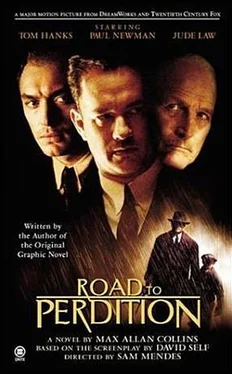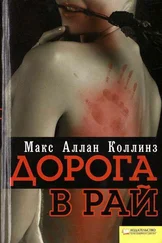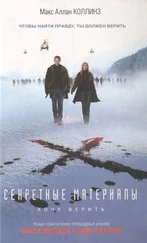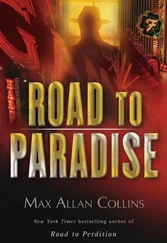“Time to go. We don’t want to wear out our welcome.”
Michael gave him no argument, though the boy was clearly conflicted about leaving behind his new “family,” and yet obviously anxious to get back out on the road with his father.
As they rolled out of the barn in the Ford, O’Sullivan waved at the farm couple, who waved back. He leaned out the window, and said, “We left a little thank you,” and pointed to the barn. Then the car rolled out onto, and down, the dirt road.
The Baums were already heading into the barn, and O’Sullivan smiled at his son, who smiled back. The couple would soon find out it sometimes paid to be hospitable: the O’Sullivan “gang” had left them stacks and stacks of money packets on a bale of hay... hundreds of thousands of dollars in Capone money. Let Choctaw top that.
They were on a paved highway when he told the boy they were heading back to the Tri-Cities.
“Why are we going back?” Michael asked.
“Something doesn’t add up, son,” he said, nodding toward the back, where the ledger books and files were now stowed in the compartment under the seat. “Men lie, but numbers don’t. Facts and figures... It’s always about money.”
“You mean, math?” the boy asked.
“Math,” his father said.
J ohn Looney had a ranch in Chama, New Mexico, an adobe fortress where he had gone from time to time, to rest or to hide out from his enemies. After the Market Square riot, when Looney was fined by the court for incitement and his newspaper (temporarily) shut down, the patriarch went to the ranch to recover from injuries delivered by local cops who were in the pocket of a Looney rival. Another time Looney holed up at the ranch recovering from wounds received in a duel. Many true-crime historians have wondered why Looney stayed around the Tri-Cities when the trouble with Mike O’Sullivan started. Some contend that he did flee, briefly at least, to his New Mexico “home away from home,” and one account has federal agents arresting him there .
Though I have no direct proof other than my recollection, I believe my father had heard from a friend on Looney’s payroll that the old man was packing up for another of these New Mexico “vacations.” This was in part why we rushed from Oklahoma back to Illinois, while Papa was still weak from his injury .
That, and the discovery he had made in that strongbox he’d taken from the suite of Alexander Rance .
A sunny Sunday morning, crisp but not quite cold, found the bells ringing and the Irish Catholics of the Illinois side of the Tri-Cities converging on St. Peter’s. The parking lot was full outside, the pews full within. God was doing a hell of a business today, John Looney thought, eyeing the throng — better business than he had, of late, his mind on this goddamned O’Sullivan matter.
Looney — along with his trusted bodyguards Jimmy and Sean (on his right and left hand, respectively), as well as other more respectable members of the parish — knelt at the altar rail to receive communion. Among the morning’s last group to receive the Eucharist, Looney rose and returned down the aisle, the congregation all around kneeling in their pews in meditation. The choir sang in the Latin gibberish that the old man found so soothing — all this ritual was reassuring, the pomp and circumstance of it such wonderful theater, the trappings a delightful blend of fear and forgiveness, mass itself a droning reiteration of tradition and order in a cruel, chaotic world.
John Looney had no use for the empty cross of the Protestants, who insisted their Christ had risen, and that the cross should be a symbol of redemption. He embraced instead the cross of the Catholics, with Jesus in plain view, suffering, bleeding, living the life of hell-on-earth His father had willed to man.
The old man in his well-pressed, somber dark suit and tie looked like a Methodist preacher himself; but the irony was lost on him. Looney sidled into his pew, and with Jimmy and Sean’s help lowered himself at the padded kneeling bench; moments later — in the row behind him — a man spoke, not in a whisper, but softly enough that only Looney (and perhaps his boys) would hear.
“Hello, John.”
Looney did not need to turn to know Mike O’Sullivan knelt at the bench in the pew directly in back of him. “I’ll be damned,” the old man breathed.
O’Sullivan said, “Not a good churchgoer like you... Sean, Jimmy. Morning.”
Looney, almost smiling, said, “You’re a clever boy, Mike. Neutral ground — sanctuary. What do you want?”
“I want to talk... in private. Downstairs.”
Looney sensed the man behind him standing, and he got to his feet — batting off the help of his chowderheaded bodyguards — and, with a nod to Sean to let him pass, moved out of the pew. In a brown suit that looked somewhat the worse for wear, O’Sullivan stood waiting for Looney to fall in alongside him, and the two bodyguards followed as the two men moved together up the aisle toward the church entrance. Around them heads were bowed, as Latin call and response echoed throughout the cavernous church and sunlight filtered in colorfully through stained glass.
Near the front doors, to the left, were stairs that went down into the basement. Then the little group, footsteps ringing off cement, was in a corridor, off of which a large room could be used for various meetings and even banquets; Michael O’Sullivan, Jr., had attended a birthday party in that very room, the night the boy’s brother was killed in his stead.
Looney nodded to Sean and Jimmy to wait outside, and he and his former chief enforcer went through a small door into another room. O’Sullivan snapped on the lights, a few bare hanging bulbs exposing in their yellowish glow an unfinished windowless concrete area that had a crypt-like atmosphere, littered with religious artifacts, some of them stored, others just abandoned.
The old man and his younger ex-associate stood facing each other — no chairs were available, though they might have used one of the pews stacked around, amid kneeling benches, various plaster saints, and a bloody Jesus on the cross leaning against the wall, a bystander with more on His mind than the two of them.
Looney had a flash of the basement of his home, and the last good time he’d had with his two godsons, playing dice, rolling the “bones” against the concrete wall, losing to Peter. He was still losing to Peter, after all these weeks.
Above them the muffled sound of mass made the Latin even more indecipherable, providing a strange, otherworldly accompaniment to their conversation.
Emotion swelled through Looney’s chest; seeing Mike O’Sullivan — his other son, the better son — filled him with emotion, much of it contradictory: love, hate, pride, shame.
“And here I thought,” Looney said, letting the brogue roll, “I would never see you again.”
“Not alive,” O’Sullivan said flatly.
That hurt the old man, and he flinched as O’Sullivan thrust something toward him: a file, a manila folder, stuffed with papers and such.
“Read that,” O’Sullivan said. “Take out your glasses, if you like.”
Looney did not reach for the file his former soldier offered him.
O’Sullivan made his sales pitch: “It’s interesting reading, John. The kind of story the News specializes in... crime, sin, betrayal... It’s all there.”
Looney waved a hand: no. Shook his head the same way.
“Read all about it, John,” O’Sullivan said, as if hawking an extra edition of Looney’s paper. “Your son has been working for Chicago. When you turn down something as beneath your dignity... narcotics, forcible white slaving, union racketeering... Connor goes right ahead with it, with Capone’s blessing.”
Читать дальше












